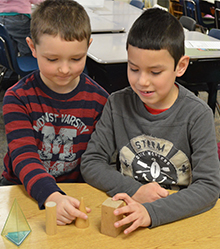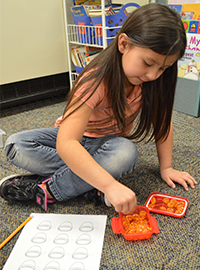It’s time for math in Sarah Bultema’s Parkview Elementary first-grade class.
“This is a 100 chart,” Bultema told students who responded with “oohs” and “aahs” as she lifted up a huge sheet of black paper. “And it’s missing the numbers…You have to find where they go on the 100 chart.”
Students soon broke into groups to eagerly glue numbers on the chart. They sorted colorful counters, molded Play-Doh into geometric shapes and counted out loud while turning flash cards into a long line of math facts.
Absent from the learning session was rote memorization– simply learning the facts.
Students instead are challenged to know what math really means, the concepts behind tallying and subtracting the numbers.
“The kids are more engaged. They retain more. It’s fun,” Bultema said.
Thanks to a Partners in Learning and Teaching Mathematics federal grant administered through Calvin College, 21 Parkview teachers are learning ways to engage students more deeply in math. Each will complete 100 hours of professional development led by Professor of Mathematics Janice Koop. West and Gladiola elementary teachers participated in previous grant sessions.
This session’s $235,000 grant is being split among Parkview, New Branches Charter School, William C. Abney Academy, both in Grand Rapids, and Anchor Point Christian School, in Wyoming.
“What it’s done is help teachers see the importance of really getting kids to understand math in depth and have the chance for discussion, to get their hands on things and experiment to try to figure it out,” said Parkview Principal Katie Jobson.
 A Shifting Focus
A Shifting Focus
Koop said many teachers have always used hands-on exploratory math activities, like in Bultema’s class, but maybe not the amount of exploring.
And with the standardized MEAP math test requiring multiple choice answers, teachers have had to focus a lot on that type of testing, sometimes resulting in a narrower teaching approach.
“Teachers have so many demands on them that it’s been hard to let kids do exploratory learning activities, and we really need exploratory learning,” Koop said.
Now the focus has shifted to the Common Core, the U.S. education initiative that seeks to establish consistent educational standards across the states. Classrooms are preparing to switch from MEAP standardized testing to the Common Core-aligned Smarter Balanced assessment in reading and math.
The test requires in-depth thinking and for students to explain their process. Koop’s “very, very hands-on” sessions tie in perfectly. She’s arming teachers with more resources and a deeper amount of content knowledge, she said. “They feel more confident about the teaching of mathematics.”
More Student Interest
Math scores need to improve at Parkview, Principal Jobson said. She is hoping to see the new teaching methods reflected in Delta Math scores, a test students take quarterly.
“You walk in (the classroom) and you can see a difference,” Jobson said. “I think they are much more engaged and they look forward to math now,” she said.
The real goal is giving students more chances to learn, different ways to come up with the right answer and to think about how they got the answer in fun ways.
“I mean who doesn’t love to play with Play-Doh and shiny little counters?” she asked.
The hands-on exploratory approach helps build a better math foundation for students, and helps eliminate the “fear of math” many students develop, Jobson said.
“I think they will have more experiences they can connect to,” she said. “Before, it was based on rote memorization and there was a lot more paper and pencil. So if they were not a kind of kid that learns ‘paper and pencil,’ they really didn’t have something to connect it to.”
CONNECT
Smarter Balanced Assessment Consortium








